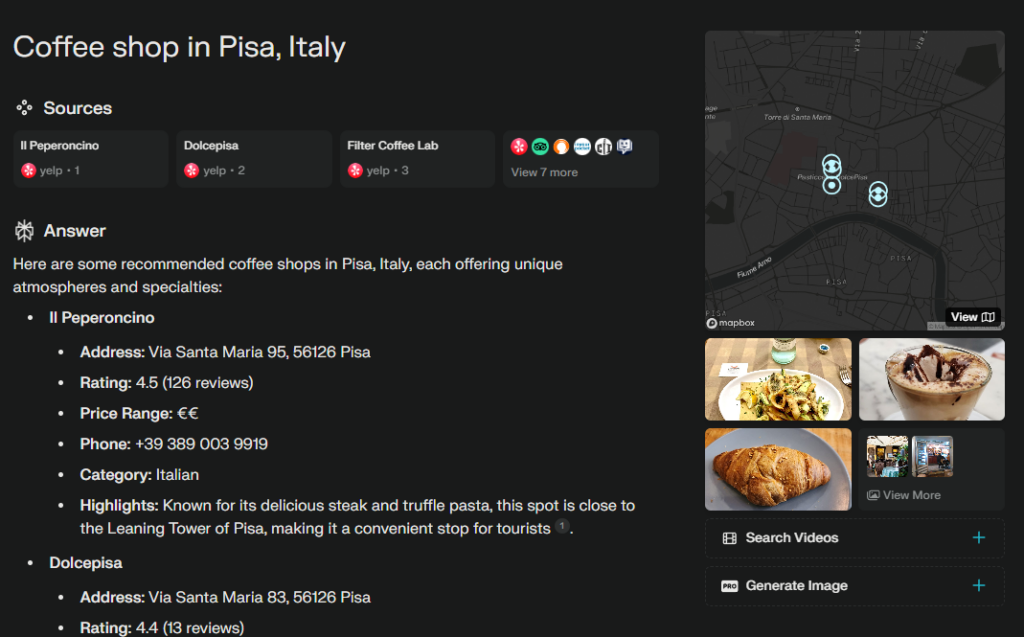AI search engines and other AI-assisted search tools (Google’s AI Overviews, Perplexity, or Gemini on Bing) are making a lot of noise among marketers. While the AI boom started with a bang, recent headlines have begun to question whether AI search is the ‘Next Big Thing’. What do marketers need to know about AI search? Should you modify your search strategies to accommodate the evolving search landscape? Is this just a fad?
Jump To:
Is AI Search Growing?
The short answer is yes. The full truth is the hype is wearing off, and the true market for this technology is beginning to reveal itself. Searches for AI search engines (search engines that use large language models (LLMs) to provide conversational, textual responses) or tools have increased 296% over the past year, from a low of about 278k searches to 1.1M searches in June 2024 per keywordtool.io. Perplexity grew 658% in the past year with Similarweb estimating its July 2024 traffic at 51.3M visits. However, OpenAI.com saw a drop of roughly 266M visits between May and July 2024.
These tools remain dwarfed by Google which maintains a massive share of the market. In fact, very recently Rand Fishkin’s SparkToro shared a report showing that AI search engines are not yet eroding Google’s market share. There are indications that users are engaging with AI search, but then returning to Google to validate the responses. In the chart below you can see Google is the second most common destination for users leaving each of the three AI Search/Chat tools.

The truth of the matter is likely that AI search is building a user base and refining its use case for a more general audience. As that becomes more clear, we can expect traffic on those sites to grow. The growth in AI search usage may not yet translate to a significant loss of market share for Google, but we’re still in the early stages. For a point of reference, TikTok (or rather, the two apps that would become TikTok) started in 2014 but wouldn’t hit the 2B download mark until 2020. These things take time.
What Risks Do AI Chat and Search Pose To Marketers?
What risks do these tools present to marketers and businesses? If AI search continues to grow, it’s likely business will have to contend with a number of issues:
Potential Risks
- Traffic loss as users stay within AI platforms rather than clicking through to websites
- Inaccuracies or confusing presentation of information about products and services
- Decreased brand awareness as smaller brands may be overshadowed by larger players
- Brand safety concerns due to the risk of AI hallucinations or unflattering associations
- Decreased marketing efficiency due to lack of attribution for AI-driven traffic
Traffic Loss
Traffic loss as users stay within AI platforms rather than clicking through to websites. By now, we’re mostly familiar with zero-click searches, where searchers’ queries are answered directly without the need to click to another site. These answers can be provided by featured snippets, knowledge panels, and other rich results. Sorry to say, AI search won’t change that.
How To Prepare: Only build necessary informational content. Focus on getting your audience the necessary, correct information about your brand and your products. Avoid building content around questions that are simple to answer. Focus on revealing depth, exploring complexity, and meeting the need of the searcher.
Inaccuracies or Confusing Presentation of Information
LLMs aim to summarize knowledge from multiple sources and condense that knowledge into tidy sentence structures. As a result, they are biased toward saving space and rely heavily on user inputs to improve output formatting. This can lead to facts about your products and your competitor’s products being combined in an answer and not being distinguished from one another. Reading this, consumers may think you offer something that you don’t or at a price that isn’t correct.
How To Prepare: Ensure information about your brand and your products are accurate in all the places they appear. If Google has a canonical or “seed” source for information about your industry or products, ensure your info is there, accurate and matches across the web. Just like good ol’ NAP optimization.
Decrease In Brand Awareness
Large legacy brands may be overtaken by trending brands or those with greater overall search interest and, conversely, smaller brands may be drowned out by larger brands with longer history and greater topical authority. It’s still too soon to say but it’s likely that the type of query and potentially relevant data about the user may determine which is true on a query-by-query basis.
Also important to note is that some tools are forging deals with brands for exclusive data rights. For example, Perplexity has a deal with Yelp where Yelp is consistently the most prominent citation shown for queries with local results (think services like plumbers, restaurants, etc.). I’d expect this to continue and have varying levels of impact depending on the type of data and its provider.
How To Prepare: Don’t rely on inbound marketing. Branding is one of your strongest levers to pull. It can cost more, but the ROI is often misattributed or unattributed so there’s a perception it’s not worthwhile. Ensure that awareness and interest in your brand exists, ensure that you have a quality page to send searchers to and then go activate those audiences!

Brand Safety Concerns
AI hallucination is a serious concern for many businesses. It’s likely that AI may say a company does something that it doesn’t do, or that it doesn’t offer something that it definitely does.LLMs may also use brand names in contexts that the business may disapprove of.
How To Prepare: The tip above helps with this, but for the most part this is a training problem the AI tool companies will have to solve. Use that thumbs down feedback button in chat interfaces and let them know how and why they got it wrong.
Decrease In Efficiency For Marketing Spend
With serious gaps in attribution, more marketing departments, CEOs, and boards will have to be comfortable with adapting and experimenting to achieve more accurate measurement. Some tools like Perplexity can be attributed because they appear as a referrer in analytics data. But other tools like ChatGPT and Gemini do not. Even Google’s AI Overviews don’t provide data to tell you that a user clicked a link in the AI-produced result. And if you don’t know where your traffic is coming from, you might not know where to spend your marketing dollars to get the best ROI.
How To Prepare: This is the most challenging. Attribution may come, it may not. Focus on ways you can get this info from your audience, if you can. My personal theory is that as soon as they start selling ads in AI Search tools, we’ll get some kind of attribution. It won’t be great, but it’ll be something.
What Opportunities Does AI Search and Chat Present For Marketers?
AI Search is growing and is likely to be at minimum a supplemental source of traffic to search engines. Here are some key opportunities businesses and brands may find in AI search and chat.
Opportunities
- Identifying issues and optimizing before AI search gains more mainstream adoption
- Improved lead qualification as AI search users may be further along the purchase funnel
- Influencing the content of AI search responses to highlight competitive advantages
Finding Issues Before AI Search Booms
Simply knowing how you appear in these tools is an advantage at this stage. The opportunity to see what needs improved or changed before a larger audience reaches the platform is a huge advantage.
Improving Lead Qualification
Whether you’re an eCommerce site, a services provider, or a tech company, the visitors who come to your site through traditional search vary in their readiness to buy. However, AI search engine use may itself be a mid-funnel activity which means that traffic from that source should be lower in the funnel. As AI search matures, we expect users to engage with these tools as they conduct research and try to narrow down which product is right for them out of a base consideration set. Currently, users must visit multiple web pages to see different comparisons and read reviews, but LLMs allow this exploration to happen conversationally in a single interface. By the time a user reaches your site, they’ll be more likely to buy.
Influencing LLM Responses
Do you have a competitive advantage? A key point of differentiation in your market? What if you could ensure it’s the first choice for an AI search response? Discover how AI-ready your content is to ensure you don’t fade into the background noise of the digital world. Even if AI search doesn’t replace Google, you could strongly influence these users.
Are You Ready For The Next Iteration of Search?
It’s improbable that we revert to simple search engines after taking the leap into AI assisted search. Marketers must have in-depth knowledge of how AI search works and can be integrated into a marketing strategy. Google will continue to show AI Overviews. Gemini, ChatGPT, Claude, and Perplexity could just be the start. What are you doing to figure out where your business fits into the world of LLMs and AI search?
Need help figuring it all out? Reach out via our contact form and see how Amsive can help you identify opportunities in AI search. Search isn’t the only thing that’s evolving, discover how Google’s third-party cookie reversal impacts your marketing.






